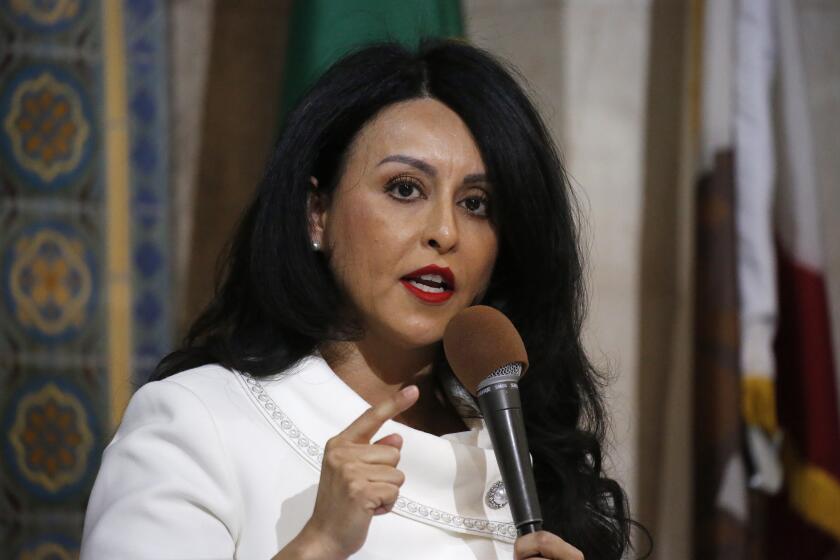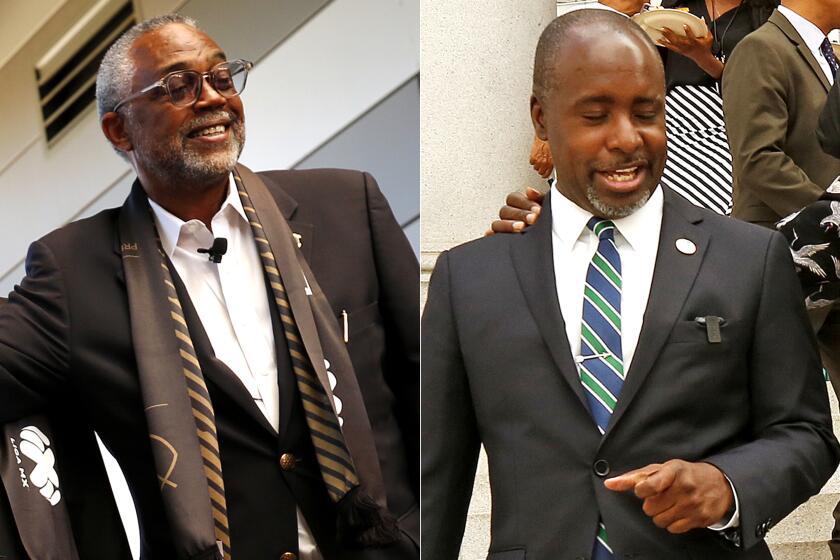California attorney general will investigate L.A. redistricting in wake of leaked audio

California Atty. Gen. Rob Bonta said Wednesday that his office would investigate the Los Angeles redistricting process that took place last fall, saying an inquiry is needed to “restore confidence” in the line-drawing of the city’s 15 council districts.
The announcement comes days after The Times published a recording in which then-council President Nury Martinez is heard making racist remarks while talking with fellow Councilmembers Kevin de León and Gil Cedillo and labor leader Ron Herrera about how the city’s council district boundaries should be redrawn. This conversation focused on how the group could maintain Latino political power while also ensuring they and their colleagues would have districts that help them win reelection.
“We’ll be conducting our investigation, and when it’s full and thorough and comprehensive and complete, we’ll have something to share about what liability there might be, either civil or criminal,” said Bonta, a former member of the state Assembly who was appointed attorney general last year.
Audio of Councilmembers Nury Martinez, Kevin de León and Gil Cedillo speaking with labor leader Ron Herrera quickly became a new and incendiary issue in the Nov. 8 election.
Bonta said his office had reviewed information — which he didn’t detail — and the law “to determine whether we feel we have a good-faith basis to launch an investigation.”
“And after conducting that process and completing that process — it was not complete yesterday, but it’s now complete — we believe we have a basis ... for an investigation,” Bonta said.
Calls for resignations and government structural reforms reverberated across L.A. after the leaked audio surfaced.
A group of 30 civic leaders sent a letter Wednesday to acting City Council President Mitch O’Farrell asking for the council to support a ballot measure to amend the City Charter to create an independent redistricting commission.
At one point in the recording, Herrera, head of the L.A. County Federation of Labor, is heard telling the councilmembers: “My goal in life is to get the three of you elected. And you know, I’m just focused on that. I mean, we’re like the little Latino caucus of, you know, our own.”
In another section, the group discusses Councilmember Marqueece Harris-Dawson and Los Angeles International Airport. Martinez recounts a conversation she had with businessman and Black leader Danny Bakewell in which she told him to tell Harris-Dawson that he should move the airport into his district.
“I told Danny: Tell Marqueece to go after the airport. You got, you got the people mover or whatever that s— is called. You’ve got the modernization project coming down,” she said. “Billions of dollars’ worth of contracts at the airport. We’re negotiating with labor on all this s—. You want to be a baller? Go after that. Because that’s where the f—ing money’s at.”
For the record:
8:01 p.m. Oct. 12, 2022A previous version of this article transposed two words in a quote from Nury Martinez. She referred to Oaxacans as “little short dark people,” not “short little dark people.”
Martinez, who referred to a Black child as a “changuito,” or little monkey, and to Oaxacans as “little short dark people” in the recording, resigned from the council Wednesday. Herrera has also stepped down.
Two L.A. City Council members are in a tug-of-war over who will represent USC. A city redistricting commission is bringing the issue to a head.
Bonta condemned the comments, calling them racist and saying they had no place in California.
“They were offensive and they were deeply painful, deeply hurtful to many communities,” he said. “The redistricting process is foundational for our democracy and for the ability of our communities to make their voices heard, and it must be above reproach.”
Bonta is seeking to hold on to his seat in the Nov. 8 election and faces Republican Nathan Hochman, a former U.S. assistant attorney general.
The redistricting process typically involves open discussions of race, economic assets such as stadiums, and population numbers, but the divisive and racist comments heard in the audio drew condemnation from across the nation.
Fred Ali, who was appointed by Martinez to the redistricting commission and served as its chairman, said he was “horrified” by “the racism you hear in these audiotapes.” He said the commission attempted to run an independent mapmaking process, free from political interference, only to see commissioners replaced as councilmembers grew unhappy with the maps.
“This should be a reminder that elected officials should not have any involvement in a redistricting process,” Ali said. “It should be an independent process. When it’s not, you get the kind of manipulation you see reflected in these audiotapes.”
Redistricting consultant Alan Clayton, who has spent 35 years advising elected officials and organizations on political mapmaking, questioned Bonta’s decision to investigate L.A.’s new district maps.
Clayton said the racist comments on the recording were “obviously reprehensible.”
But the exchanges about protecting incumbents and moving economic assets from one district to another are “a political issue, not a criminal issue” — and are typical during redistricting battles, he said.
“Redistricting is a cutthroat business where people try to win in a cutthroat fashion,” he said. Politicians frequently “support maps that help them and their allies and oppose maps that hurt them and their allies.”
To change L.A.’s redistricting process substantively, the City Council would need to ask voters to increase the size of the council or establish an independent redistricting commission — one that removes the council from the process, Clayton said.
Since the leak, some politicians have recommended stripping the City Council of its redistricting power. The body relies on an independent commission to advise on the maps but has the ultimate vote.
California voters in 2008 and 2010 stripped the state Legislature of power over the redistricting process, and handed the responsibility of drafting state legislative, Board of Equalization and congressional boundaries to an independent 14-member commission.
The California Citizens Redistricting Commission is composed of five Republicans, five Democrats and four individuals unaffiliated with a party, all of whom have to apply for a spot on the panel and go through a lengthy selection process.
The commission uses census data every decade to draw the maps, and has a year to determine and approve the boundaries through a process that requires public hearings and input.
The commission then certifies and submits the maps to the California secretary of state before they’re used in the next election cycle.
Matt Rexroad, a Republican political consultant and redistricting expert, said there are many ways local governments can handle the mapdrawing process.
But an independent redistricting commission is “tailor-made for a city like Los Angeles,” Rexroad said, because of its size and diversity.
“The reason that you saw this movement toward independent redistricting commissions was because of fears of conversations happening behind closed doors like we happened to have the opportunity to listen to,” he said. “They were attempting ‘us versus them.’”
Paul Mitchell, who served as a consultant to the city’s redistricting commission, called L.A.’s redistricting the “worst kind of process.”
“The appointees are appointed by the councilmembers and the mayor. If the appointees aren’t doing what they want, they end up replacing the appointees. They talk in those tapes about actually communicating with their appointees and giving them direction,” Mitchell said. “And when the map is finalized, it gets sent back to the City Council and the City Council gets to essentially do whatever they want.
“It gives the illusion of transparency and that the public’s interest is driving the map drawing,” Mitchell added. “But it doesn’t mean anything if the council gets to redo it how they want or if the council is meddling the whole time.”
More to Read
Sign up for Essential California
The most important California stories and recommendations in your inbox every morning.
You may occasionally receive promotional content from the Los Angeles Times.
















